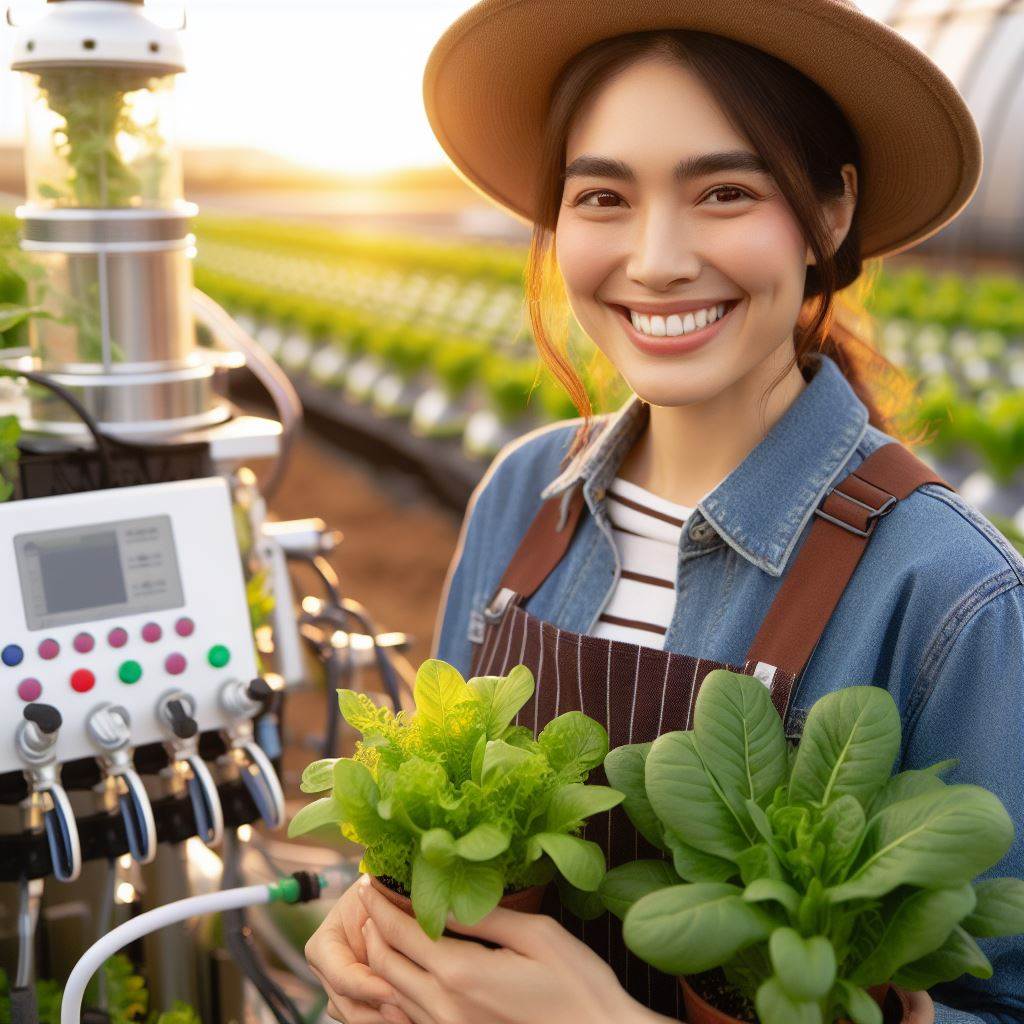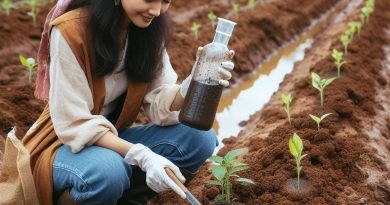Tech & Organic Farming: A New Blend
Last Updated on March 2, 2024
Introduction
In recent years, the importance of technology in agriculture has become increasingly evident.
With the growing interest in organic farming, there is now a need to explore the blend of tech and organic farming.
Technology has revolutionized the agricultural industry by providing farmers with tools and techniques to optimize production.
From GPS-guided tractors to automated irrigation systems, technology has increased efficiency and reduced labor.
On the other hand, organic farming seeks to minimize the use of synthetic inputs and promote natural processes.
It focuses on sustainability and environmental preservation.
The integration of technology in organic farming can greatly benefit both farmers and consumers.
For instance, sensor-based systems can help monitor soil moisture and nutrient levels, ensuring optimal conditions for plant growth.
Furthermore, drones equipped with cameras and sensors can detect crop diseases or pests, allowing farmers to take immediate action.
This reduces the need for pesticide use and promotes healthier crops.
Another example is the use of precision farming techniques in organic agriculture.
By collecting and analyzing data from various sources, farmers can make more informed decisions regarding planting, fertilization, and pest control.
The blend of tech and organic farming presents an opportunity to bridge the gap between conventional and sustainable practices.
It combines the best of both worlds, maximizing productivity while minimizing environmental impact.
In short, as the world’s population continues to grow and resources become scarcer, the blend of tech and organic farming holds great potential for the future of agriculture.
By harnessing technological advancements to enhance organic practices, we can create a more sustainable and efficient farming system.
Benefits of technology in organic farming
Technology has revolutionized every sector, and organic farming is no exception.
The integration of technology has brought about numerous benefits in terms of efficiency, productivity, resource conservation, and pest management.
Here are some key advantages of technology in organic farming:
Increased efficiency and productivity
- Farmers can automate various tasks, reducing manual labor and saving time.
- Advanced machinery and equipment enable faster and more precise planting, cultivating, and harvesting.
- Real-time monitoring systems allow farmers to optimize irrigation and nutrient applications.
- Efficient use of resources helps maximize yields and reduce overall costs.
Resource conservation and sustainability
- Technology helps in water management through sensors, reducing water wastage and preserving this precious resource.
- Precision agriculture techniques ensure precise application of fertilizers, minimizing nutrient runoff and soil degradation.
- Smart farming practices result in reduced energy consumption and carbon emissions.
- Improved soil health and biodiversity preservation contribute to the long-term sustainability of organic farming.
Data-driven decision making
- Collecting and analyzing data from sensors, drones, and satellite imagery provides valuable insights for decision making.
- Historical and real-time data helps farmers make informed choices about crop rotation, pest control, and resource allocation.
- Predictive analytics enable early detection of disease outbreaks, allowing proactive measures to prevent their spread.
- Data-driven decision making optimizes resource allocation and increases the overall effectiveness of organic farming.
Pest and disease management
- Technology offers non-toxic alternatives to conventional pesticides, reducing chemical usage and minimizing environmental impact.
- Remote sensing and imaging technologies facilitate early detection of pests and diseases, enabling prompt intervention.
- Integrated pest management systems combine biological control methods and data analysis to effectively combat pests.
- Continuous monitoring and automated warning systems help farmers respond quickly to potential outbreaks.
In general, the integration of technology in organic farming brings numerous benefits that enhance efficiency, productivity, and sustainability.
Through automation, real-time monitoring, and data-driven decision making, farmers can optimize resource utilization, conserve the environment, and manage pests effectively.
Embracing technology is crucial in maximizing the potential of organic farming and meeting the growing demand for healthy, sustainable food.
Read: Soil Testing 101: Key Steps & Benefits
Examples of technology used in organic farming
Organic farming has traditionally been associated with traditional and low-tech practices.
However, with the recent advancements in technology, organic farmers are embracing new tools and techniques that enhance their farming methods.
Precision agriculture tools
One of the areas where technology has made a significant impact is precision agriculture.
Precision agriculture tools allow farmers to monitor and manage their fields more efficiently.
Drones and aerial imaging, for instance, provide valuable insights into crop health, pest infestations, and nutrient deficiencies.
Additionally, GPS and satellite technology help farmers track and map their fields accurately.
Soil and moisture sensors are another important technological tool used in organic farming.
These sensors provide real-time data on soil moisture levels, enabling farmers to optimize irrigation practices and conserve water.
By using these sensors, farmers can avoid over-watering their crops, which is beneficial for both the environment and crop health.
Robotics and automation
Robotics and automation have also found their place in organic farming.
These technologies aid farmers in weed control and precision seeding.
Robots equipped with advanced imaging systems can identify and eliminate weeds without the need for herbicides.
Precision seeders, on the other hand, ensure accurate placement of seeds, leading to better crop establishment.
Harvesting and sorting are labor-intensive tasks in organic farming.
However, with the help of robotics and automation, these tasks can be streamlined and made more efficient.
Automated harvesters can identify ripe fruits and vegetables and pick them with minimal damage.
Sorting systems equipped with AI algorithms can categorize and grade harvested produce quickly and accurately.
Internet of Things (IoT) devices
The Internet of Things (IoT) devices also play a significant role in modern organic farming.
Smart farming systems, equipped with sensors, actuators, and interconnected devices, allow farmers to remotely monitor and control various aspects of their operations.
Livestock monitoring and management systems use IoT devices to track animal health, behavior, and productivity.
These technologies not only improve farming efficiency but also enhance animal welfare.
Biotechnology in organic farming
Biotechnology, sometimes viewed as controversial in organic farming, has also found its place in the industry.
Biological pest control, such as the use of beneficial insects, helps organic farmers combat crop pests without relying on synthetic pesticides.
Furthermore, biotechnology has led to the development of improved organic crop varieties with traits like disease resistance and higher yields, contributing to sustainable organic farming practices.
In fact, technology has become a vital component of modern organic farming.
Precision agriculture tools, robotics and automation, IoT devices, and biotechnology have all contributed to the evolution of organic farming practices.
These technologies not only improve efficiency and productivity but also promote sustainable and environmentally friendly farming methods.
Embracing these new tools and techniques allows organic farmers to achieve greater success without compromising their commitment to organic principles.
Read: Effective Soil Fertility Tactics Explored

Challenges and Considerations in Blending Tech and Organic Farming
In the pursuit of combining technology and organic farming, there are several challenges and considerations that need to be addressed.
These include cost and accessibility, compatibility with organic farming regulations, maintaining the integrity of organic farming practices, and potential risks and unintended consequences.
Cost and Accessibility
- The integration of technology in organic farming can be expensive, making it inaccessible for small-scale farmers.
- Access to high-tech equipment and tools may be limited, hindering the adoption of technology in organic farming.
- Investments in technology require financial resources that may not be readily available for organic farmers.
- Furthermore, the cost of training and education for farmers to effectively use technology can be an additional burden.
Compatibility with Organic Farming Regulations
- Several organic farming regulations might not have provisions for the use of certain technologies.
- The use of advanced machinery and synthetic substances can contradict the principles of organic farming.
- Integrating technology without compromising the organic certification process requires careful consideration and adaptation.
- Farmers must ensure that the technology they employ aligns with organic farming regulations to maintain authenticity.
Maintaining the Integrity of Organic Farming Practices
- Technology should not compromise the core principles of organic farming, such as biodiversity and soil health.
- Care must be taken to avoid excessive reliance on technology, which may weaken farmers’ skills and traditional knowledge.
- Preserving sustainable practices and natural methods is essential in blending tech and organic farming.
- Efforts should be made to strike a balance between technological advancements and maintaining the essence of organic farming.
Potential Risks and Unintended Consequences
- The integration of technology can introduce unforeseen risks, such as dependence on unreliable or malfunctioning systems.
- Increased automation may lead to reduced human intervention, potentially affecting job opportunities in the agricultural sector.
- Technological malfunctions or cybersecurity breaches can have detrimental effects on organic farming operations.
- Genetic modifications used in technology may have long-term ecological consequences that could disrupt natural ecosystems.
In summary, while blending technology with organic farming offers numerous benefits, there are important considerations and challenges that must be addressed.
The cost and accessibility of technology, compatibility with organic farming regulations, maintaining organic farming practices, and potential risks are crucial aspects to be mindful of.
By addressing these challenges, the integration of technology and organic farming can pave the way for sustainable and efficient agricultural practices.
Read: Mastering Soil pH: A Guide for Growers
You Might Also Like: Balancing Soil Nutrients for Crops
Successful case studies and real-world examples
Farms implementing tech in organic practices
- Meadows Farm in California integrated technology into their organic farming methods.
- They used drones equipped with sensors to monitor crop health and identify pest infestations.
- This allowed them to take immediate action and reduce the use of harmful pesticides.
- White Crops Farm in Oregon used automated irrigation systems to optimize water usage in their organic fields.
- By precisely controlling the amount of water delivered to each plant, they achieved higher yields and saved resources.
Verified positive outcomes
- Meadows Farm reported a significant decrease in pest damage after implementing tech solutions.
- They saw a 20% increase in crop yield due to early pest detection and targeted interventions.
- White Crops Farm reduced water usage by 30% by using automated irrigation systems.
- This not only conserved water but also reduced energy consumption and labor costs.
Lessons learned and best practices
- Farms looking to adopt technology in organic farming should start with a clear goal and plan.
- It’s important to research and invest in technology that aligns with organic principles and practices.
- Regular training of farm staff is crucial to ensure effective and efficient use of technology.
- Collaborating with technology providers and seeking advice from experts can enhance implementation.
- Continuous monitoring and evaluation of tech solutions help identify areas for improvement and maximize benefits.
- It’s essential to maintain a balance between technology use and maintaining the integrity of organic farming.
The integration of technology in organic farming has proven successful through various case studies and real-world examples.
Farms implementing tech solutions have witnessed positive outcomes such as reduced pest damage, increased crop yields, and optimized resource utilization.
It is important for farmers to learn from these experiences and adopt best practices when incorporating technology into their organic practices.
By leveraging the power of technology while staying true to organic principles, farmers can achieve sustainable and efficient farming practices that benefit both the environment and their businesses.
Read: Boost Crops: Top Soil Nutrients Tips
You Might Also Like: Crop-Specific Tech: Precision Cultivation Tips
Future prospects and emerging technologies
Advances in machine learning and AI
The integration of machine learning and AI has the potential to revolutionize organic farming.
With the help of advanced algorithms, farmers can analyze vast amounts of data to make informed decisions about crop management, pest control, and soil health.
Machine learning algorithms can be trained to recognize patterns and predict crop yields based on historical data, weather conditions, and other variables.
This enables farmers to optimize their farming practices and maximize productivity while minimizing costs and environmental impact.
Blockchain technology in organic certification
Blockchain technology has the potential to enhance transparency and trust in the organic certification process.
By utilizing a decentralized and tamper-proof ledger, organic farmers can securely record and verify all stages of production and distribution.
This technology ensures that organic certifications are genuine and provides consumers with real-time access to information about the origin and quality of their food.
By eliminating the possibility of fraudulent practices, blockchain technology strengthens the integrity of the organic farming industry.
Nanotechnology applications in organic farming
Nanotechnology offers exciting possibilities for improving crop production and pest control without the use of harmful chemicals.
Nanomaterials can be used to develop smart delivery systems for nutrients and pesticides, ensuring targeted and controlled release.
These nanomaterials can also be used to enhance the efficiency of water and nutrient absorption by plants, reducing waste and increasing overall crop yields.
Furthermore, nanosensors can be deployed to monitor soil moisture levels, nutrient availability, and pest infestations, providing real-time data for farmers to make informed decisions.
Collaborative research efforts and innovation
The future of organic farming relies on collaborative research efforts and innovation.
Scientists, farmers, and technology experts need to come together to develop and implement cutting-edge solutions that address the challenges faced by the industry.
Collaborative research initiatives can lead to the discovery of new organic farming techniques, development of novel organic fertilizers and pesticides, and improvement of sustainable farming practices.
By fostering a culture of innovation, organic farming can continue to evolve and thrive in the face of changing environmental and economic conditions.
the future of organic farming looks promising with advancements in machine learning and AI, the implementation of blockchain technology in organic certification, the application of nanotechnology, and collaborative research efforts that drive innovation within the industry.
These emerging technologies have the potential to significantly improve the efficiency, sustainability, and transparency of organic farming, ensuring a better future for both farmers and consumers.
Conclusion
Recap of Benefits and Challenges
In our journey through the synergy of tech and organic farming, we’ve witnessed remarkable strides.
Precision farming, aided by smart sensors, enhances yield while minimizing resource use.
Despite the gains, challenges like initial setup costs and technological literacy persist.
Encouragement for Further Exploration
Embracing technology in organic farming isn’t just a choice; it’s a necessity.
The future demands efficient, sustainable practices.
As we delve deeper, let’s encourage continuous exploration, sharing insights, and fostering a collaborative spirit among farmers.
The Promising Future Ahead
The blend of technology and organic farming paints a promising future.
With AI-driven analytics optimizing crop cycles and drones monitoring field health, sustainable agriculture becomes a reality.
This dynamic fusion ensures increased yields, reduced environmental impact, and resilience in the face of a changing climate.
In closing, let’s sow the seeds of innovation in our fields.
The synergy between technology and organic farming isn’t just a blend; it’s a revolution shaping the future of agriculture.


